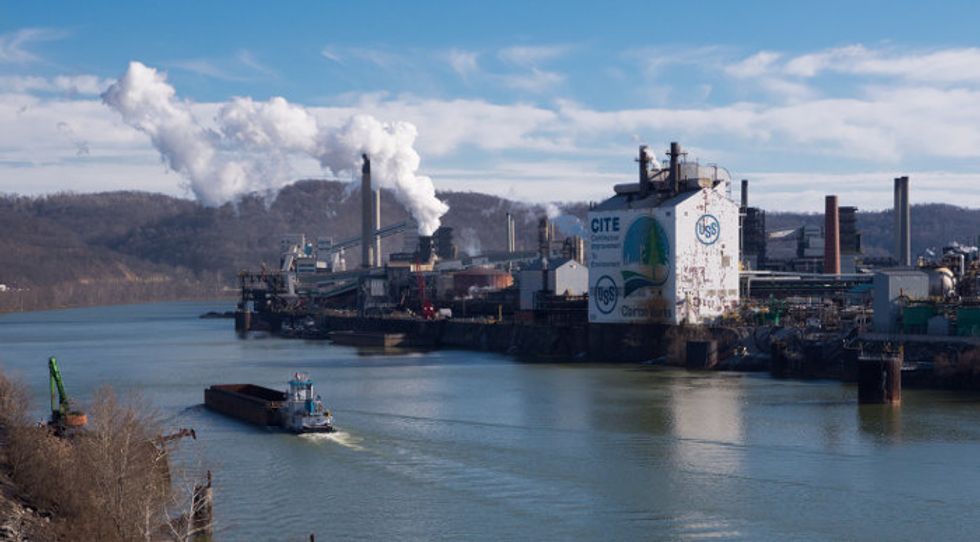
PITTSBURGH — Pollution from Pennsylvania’s three remaining coal-based steelmaking plants cause an estimated 50 to 92 premature deaths each year, according to a new report.
The report, published by Industrious Labs, an environmental advocacy organization focused on decarbonizing heavy industry, looked at pollution and health data to estimate the total, facility-level, and state-level costs of the 17 coal-based steelmaking plants that are still in operation across the U.S., located in Indiana, Ohio, Pennsylvania, Illinois, Michigan and Virginia.
Coal-based steelmaking involves heating coal to extremely high temperatures to convert it to coke, a key ingredient in steelmaking. The process emits large volumes of toxic pollutants, including nitrogen oxides (NOx), sulfur dioxide (SO2), particulate matter (PM2.5), benzene and lead compounds. Exposure to coke oven emissions is linked to cancer, respiratory disease and heart disease.
“Steel communities have been sounding the alarm on harmful air pollution for years, and this report quantifies just how devastating and far-reaching the consequences are,” Hilary Lewis, steel director at Industrious Labs, said in a statement.
Pennsylvania has three coal-based steel plants in operation, all of which are located near Pittsburgh: U.S. Steel’s Clairton Coke Works and Edgar Thomson Mill, and Cleveland-Cliff’s Monessen plant.
According to the report, every year these three facilities in southwestern Pennsylvania cause an estimated:
- 54 ER visits for respiratory problems
- 24,949 cases of asthma symptoms
- 3,988 missed work days
- 6,965 missed school days
- $800 million-$1.4 billion in health costs
- $16 million in lost economic activity
U.S. Steel has been fined more than $20 million for Clean Air Act violations at its Pittsburgh-area facilities since 2018, and the company recently settled a lawsuit with environmental advocacy groups for about $25 million over more than 12,000 air permit violations in the region.
The company’s failure to maintain its Pennsylvania facilities has resulted in both chronic and acute health problems for communities around the plants.
“It's completely unacceptable and untenable for a community to be subjected to thousands of violations of the Clean Air Act for decades,” Matt Mehalik, executive director of the Breathe Project, a coalition of more than 40 environmental advocacy groups in the region, told EHN.
U.S. Steel’s Clairton Coke Works alone is responsible for up to 66 premature deaths, 41 emergency room visits for respiratory problems, 18,664 asthma symptoms and 5,786 missed school days, according to the report.
The report also found that Allegheny County, which is home to U.S. Steel’s Clairton Coke Works and Edgar Thomson Mill, ranks eighth for health risks among all Pennsylvania counties. Westmoreland County, home to Cleveland-Cliffs Monessen, ranks ninth.
"For decades, communities near steel and coke plants have been forced to choose between their health and good jobs, enduring toxic pollution, chronic illnesses, and premature deaths," Yong Kwon, senior policy advisor for the Industrial Transformation Campaign at the Sierra Club, said in a statement.
National costs of coal-based steelmaking

Industrious Labs used self-reported industry data collected by the U.S. Environmental Protection Agency (EPA) and a risk assessment modeling tool from the agency for its report.
Beyond Pennsylvania, the analysis found the 17 remaining coal-based facilities in the U.S. are estimated to cause up to 892 premature deaths, 250,500 cases of asthma symptoms, and $13.2 billion in health costs.
In 2020 alone, these 17 plants released an estimated:
- 24,400 tons of nitrogen oxides
- 32,000 tons of sulfur dioxide
- 9,000 tons of fine particulate matter (PM2.5)
- 177,000 tons of carbon monoxide, and
- 7 tons of lead
The EPA is in the process of finalizing new regulations for coke plants meant to curb harmful emissions, but the industry has pushed back against these rules, while health advocates say they aren’t stringent enough.
“The EPA has consistently failed to safeguard the health of these communities from the dangers of coal-based steelmaking,” Lewis said. “It’s time for stronger regulations that recognize the opportunity of cleaner steelmaking technologies and tougher enforcement of penalties on polluters to truly protect public health.”
Many steel companies are shifting toward cleaner steelmaking. About 70% of steel produced in the country is made with electric arc furnaces, which do not use coal, while the remaining 30% still use coal.
But U.S. Steel — and Japan-based Nippon Steel, which is working to acquire U.S. Steel — have both fallen behind when it comes to cleaner steelmaking.
"By embracing cleaner technologies, we can prevent harmful pollution while also securing good jobs in the growing green economy, ensuring that no one has to choose between a healthy environment and a strong livelihood,” said Kwon.

 2 hours ago
19
2 hours ago
19

